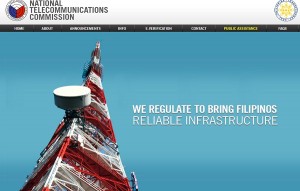
The audit was in line with a crackdown on frequency “warehousing” that was launched by the NTC last year, under the direction of the Department of Information and Communications Technology (DICT).
Radio frequencies are considered the lifeblood of the telecommunications industry. These allow the transmission of various forms of data, enabling phone calls, text messaging, and internet browsing on mobile phones.
Radio spectrum, which is limited, is not owned by the private sector, but is instead assigned by the government for their use. For this, a spectrum user fee is paid to the NTC.
Not all radio frequencies are allocated for ever-growing wireless consumer needs. Some are also assigned for military and national security systems, satellite and maritime communications, and weather radar.
In other words, the radio spectrum is valuable and scarce and has to be allocated as efficiently as possible.
The NTC’s intention in the audit was to weed out companies hoarding frequency assets for speculative purposes. It can recall such frequencies for possible reassignment to telco incumbents PLDT Inc. and Globe Telecom, or for an auction to a new telco player.
According to the NTC, there were 17 assignments for which assigned firms were not using the frequencies or paying the fees.
These included frequencies in the key 2500 and 3400 bands, which were currently being utilized for public use.
Moreover, there were nine entities that were using their assigned frequencies – but not paying the required fees.
These were mostly government agencies, including the Metropolitan Manila Development Authority (MMDA), Philippine National Police (PNP), and Armed Forces of the Philippines (AFP). Also listed here were the Metro Rail Transit Authority (MRTA), the Presidential Security Grou (PSG), and the “military.” These were all in the 800 Megahertz (MHz) band.
ABS-CBN Corp. was listed among those using frequencies. But it has not paid the associated fees (800 MHz and1900 MHz). An ABS-CBN spokesperson did not immediately respond to a request for comment.
Companies not using and not paying the fees for their assigned frequencies were Sears Telecoms for the 410 MHz band; and TNRI, Trilight, RBC, Ceza, Uniden, LBNI, Worldwide Comms Inc. for the 800 MHz band.
In the 2500 MHz, Bayan Telecommunications, now owned by Globe, had not been using but paying for its assigned frequencies.
For the 3400 MHz, non-paying and non-using companies were Easycall Communications Philippines, AZ Comm, Worldwide Communications Inc., Mutlimeida Telephony Inc., Broadband Everywhere Corp. (formerly Textron Corp.), and Radio Marine Network Inc.
For the 10 GHz, there were TN Romasanta and MMDA, both not using the frequencies and not paying their fees.
According to the NTC, frequencies heavily utilized by the telcos were the 700 MHz (20MHz of which was returned to the NTC), 850MHz, 900MHz, 1800 MHz, 1900 MHz, 2100 MHz, 2300 MHz, 2500 MHz, and 3400 MHz bands.
DICT Secretary Rodolfo Salalima said on Wednesday that erring companies would be asked to explain their non-use or non-payment of their assigned assets. In case warranted, he said the government would initiate a recall procedure on the frequencies. /atm